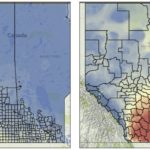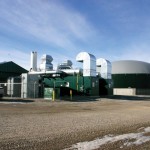Reading Time: 2 minutes Tim McAllister has been awarded the 2016 Canadian Beef Industry Award for Outstanding Research and Innovation. McAllister, who grew up on a cow-calf operation near Innisfail, has gained international recognition for his work on antimicrobial resistance, beef cattle nutrition, silage science, greenhouse gas emissions, E. coli 0157:H7, and prion science. He is a principal research […] Read more

Renowned Alberta researcher honoured

Southern Alberta could soon have Texas weather
Want to see the climate projections for your county? New online atlas predicts a sweltering future
Reading Time: 5 minutes Western Canada is on an “inevitable” march towards hot, dry summers and mild winters that will make southern Alberta feel like northern Texas, according to a new climate change mapping program. “One of the big, striking conclusions of the atlas is that, even if we reduce emissions, we still see substantial changes to our climate,” […] Read more

Grasslands a carbon-capture colossus
Do the math: Take Alberta $15-per-tonne carbon tax and then look at how much carbon is stored in grasslands
Reading Time: 3 minutes If the Alberta government really wants to reduce greenhouse gas emissions in the province, it should start with an incentive for farmers to reduce annual cropping, says a rangeland management expert. “There’s a pretty compelling case about why there should be a direct economic incentive for producers to maintain or even increase the amount of […] Read more
Federal funding available to help cut farm greenhouse gases
Reading Time: < 1 minute A federal program backing research into farm-level technologies and practices that limit farms’ greenhouse gas emissions has been extended for another five-year run. Ottawa will put $27 million into the next phase of the Agricultural Greenhouse Gases Program, which gave out $21 million in funding to 18 projects in the first five-year phase. Among those […] Read more

Farm emissions research program renewed
A federal program backing research into farm-level technologies and practices that limit farms’ greenhouse gas (GHG) emissions has been picked up for another five-year run. Agriculture Minister Lawrence MacAulay on Wednesday announced $27 million is budgeted over the 2016-21 period for the Agricultural Greenhouse Gases Program (AGGP). More information about criteria for the renewed program […] Read more

Schoepp: What’s a more important sector: oil or agriculture?
Take a comprehensive look at the facts and the answer is obvious
Reading Time: 4 minutes As we drove through the blueberry fields and cranberry bogs in southern B.C., I thought of economic generators. What, I wondered, was a bigger sustainable economic generator to our nation: oil or agriculture? An environmental scan of an industry must include the long-term effects on people and the planet. The structures that we employ for […] Read more

Lethbridge facility creates green energy by turning manure to megawatts
Lethbridge Biogas plant can power 2,800 homes, with more than half of its ‘fuel’ coming from livestock manure
Reading Time: 3 minutes Alberta is famous for its black gold, but a newly commissioned $30-million biogas plant in Lethbridge is drawing attention for being on the cutting edge of green power. “It’s potentially the most technologically advanced, privately held biogas plant in the world today,” said Thane Hurlburt, a rancher and president of Lethbridge Biogas. “We can operate […] Read more

